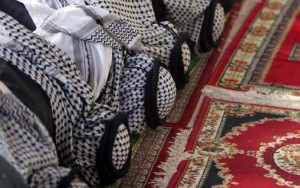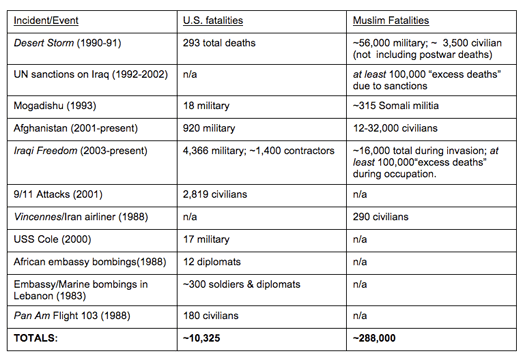By Stephen M. Walt | Originally published by Foreign Policy
 Tom Friedman had an especially fatuous column in Sunday’s New York Times, which is saying something given his well-established capacity for smug self-assurance. According to Friedman, the big challenge we face in the Arab and Islamic world is “the Narrative” — his patronizing term for Muslim views about America’s supposedly negative role in the region. If Muslims weren’t so irrational, he thinks, theywould recognize that “U.S. foreign policy has been largely dedicated to rescuing Muslims or trying to help free them from tyranny.” He concedes that we made a few mistakes here and there (such as at Abu Ghraib), but the real problem is all those anti-American fairy tales that Muslims tell each other to avoid taking responsibility for their own actions.
Tom Friedman had an especially fatuous column in Sunday’s New York Times, which is saying something given his well-established capacity for smug self-assurance. According to Friedman, the big challenge we face in the Arab and Islamic world is “the Narrative” — his patronizing term for Muslim views about America’s supposedly negative role in the region. If Muslims weren’t so irrational, he thinks, theywould recognize that “U.S. foreign policy has been largely dedicated to rescuing Muslims or trying to help free them from tyranny.” He concedes that we made a few mistakes here and there (such as at Abu Ghraib), but the real problem is all those anti-American fairy tales that Muslims tell each other to avoid taking responsibility for their own actions.
I heard a different take on this subject at a recent conference on U.S. relations with the Islamic world. In addition to hearing a diverse set of views from different Islamic countries, one of the other participants (a prominent English journalist) put it quite simply. “If the United States wants to improve its image in the Islamic world,” he said, “it should stop killing Muslims.”
Now I don’t think the issue is quite that simple, but the comment got me thinking: How many Muslims has the United States killed in the past thirty years, and how many Americans have been killed by Muslims? Coming up with a precise answer to this question is probably impossible, but it is also not necessary, because the rough numbers are so clearly lopsided.
Here’s my back-of-the-envelope analysis, based on estimates deliberately chosen to favor the United States. Specifically, I have taken the low estimates of Muslim fatalities, along with much more reliable figures for U.S. deaths.

To repeat: I have deliberately selected “low-end” estimates for Muslim fatalities, so these figures present the “best case” for the United States. Even so, the United States has killed nearly 30 Muslims for every American lost. The real ratio is probably much higher, and a reasonable upper bound for Muslim fatalities (based mostly on higher estimates of “excess deaths” in Iraq due to the sanctions regime and the post-2003 occupation) is well over one million,equivalent to over 100 Muslim fatalities for every American lost.
Figures like these should be used with caution, of course, and several obvious caveats apply. To begin with, the United States is not solely responsible for some of those fatalities, most notably in the case of the “excess deaths” attributable to the U.N. sanctions regime against Iraq. Saddam Hussein clearly deserves much of the blame for these “excess deaths,” insofar as he could have complied with Security Council resolutions and gotten the sanctions lifted or used the “oil for food” problem properly. Nonetheless, the fact remains that the United States (and the other SC members) knew that keeping the sanctions in place would cause tens of thousands of innocent people to die and we went ahead anyway.
Similarly, the United States is not solely to blame for the sectarian violence that engulfed Iraq after the 2003 invasion. U.S. forces killed many Iraqis, to be sure, but plenty of Shiites, Kurds, Sunnis, and foreign infiltrators were pulling triggers and planting bombs too. Yet it is still the case that the United States invaded a country that had not attacked us, dismantled its regime, and took hardly any precautions to prevent the (predictable) outbreak of violence. Having uncapped the volcano, we are hardly blameless, and that goes for pundits like Friedman who enthusiastically endorsed the original invasion.
Third, the fact that people died as a result of certain U.S. actions does not by itself mean that those policy decisions were wrong. I’m a realist, and I accept the unfortunate fact that international politics is a rough business and sometimes innocent people die as a result of actions that may in fact be justifiable. For example, I don’t think it was wrong to expel Iraq from Kuwait in 1991 or to topple the Taliban in 2001. Nor do I think it was wrong to try to catch Bin Laden — even though people died in the attempt — and I would support similar efforts to capture him today even if it placed more people at risk. In other words, a full assessment of U.S. policy would have to weigh these regrettable costs against the alleged benefits to the United States itself or the international community as a whole.
Yet if you really want to know “why they hate us,” the numbers presented above cannot be ignored. Even if we view these figures with skepticism and discount the numbers a lot, the fact remains that the United States has killed a very large number of Arab or Muslim individuals over the past three decades. Even though we had just cause and the right intentions in some cases (as in the first Gulf War), our actions were indefensible (maybe even criminal) in others.
It is also striking to observe that virtually all of the Muslim deaths were the direct or indirect consequence of official U.S. government policy. By contrast, most of the Americans killed by Muslims were the victims of non-state terrorist groups such as al Qaeda or the insurgents in Iraq and Afghanistan. Americans should also bear in mind that the figures reported above omit the Arabs and Muslims killed by Israel in Lebanon, Gaza, and the West Bank. Given our generous and unconditional support for Israel’s policy towards the Arab world in general and the Palestinians in particular, Muslims rightly hold us partly responsible for those victims too.
Contrary to what Friedman thinks, our real problem isn’t a fictitious Muslim “narrative” about America’s role in the region; it is mostly the actual things we have been doing in recent years. To say that in no way justifies anti-American terrorism or absolves other societies of responsibility for their own mistakes or misdeeds. But the self-righteousness on display in Friedman’s op-ed isn’t just simplistic; it is actively harmful. Why? Because whitewashing our own misconduct makes it harder for Americans to figure out why their country is so unpopular and makes us less likely to consider different (and more effective) approaches.
Some degree of anti-Americanism may reflect ideology, distorted history, or a foreign government’s attempt to shift blame onto others (a practice that all governments indulge in), but a lot of it is the inevitable result of policies that the American people have supported in the past. When you kill tens of thousands of people in other countries — and sometimes for no good reason — you shouldn’t be surprised when people in those countries are enraged by this behavior and interested in revenge. After all, how did we react after September 11?

This is a wonderful article. I think it presents some great points, BUT I think we should keep in mind given these estimates, the US may not be the common denominator when discussing Islamic genocide/ murder. We must remember China, Russia and Europe have had their share in this “business”.
China has anywhere in between 20-300 million Muslims living within their boarders (they will not give us a proper estimate for “national security reasons”.)
Given most these Muslims live in northwest China, an area notorious for Chinese governmental oppression, it may well be within reason to consider this zone a Muslim slaughter house (for lack of a better term) incomparable to anywhere else in the world, both directly and indirectly.
And Allah (swt) knows best.
Regards
The rights discourse is problematic when you consider that rights somehow follow Maslows theory of hierarchy: individual, economic and cultural. in that order. A little bit of history will go like this– the magna-carta and habeus corpus champions basic human rights; to have the right to live. the french revolution creates the premise for welfare societies based on social justice and post-modernism gives notions of freedom of expression, identities based on sexuality, linguistic and ethnic rights etc.
In this equation citizenship is the common denominator of any individual living within a boundary of nation-state, where the state or its international underwriters are guarantors of its protection as seen fit in the framework of a rights hierarchy. in that discourse many muslim majority countries became oppressors of their own minorities, muslim and non-muslim alike. It would be difficult to find a muslim country that does not discriminate their citizens at some level of rights discourse.
rights are rights, just as lives are lives. but societies have always resisted a way to regulate a universal right. rights discourse become bases for intervention, domination, resistence and re-interpretation. rationalism says that colonialists became liberators because it was more profitable to share the proceeds by proxy than oppression. neo-liberalism can thrive after post-colonialism because oppression/loss of the individual can be compensated or traded off monetarily. our laws ensure that equivalency of loss is measured based on the hierarchy of rights so that human capital can be requited by economic/cultural capital. humans become a measurement of his or her compensative value. how much are you going to settle for your worth, becomes the question when it comes to your right.
Thank you for writing this article. I have been having an ongoing discussion with someone whom I think highly of about this very subject. My soul is at ease now, this is exactly what I have been saying. Truth has got to be acknowledged ………. BY ALL, including non-Muslims and Muslims world-wide.